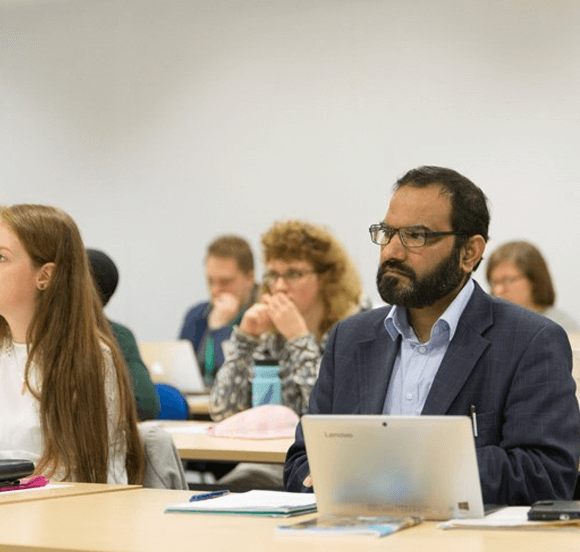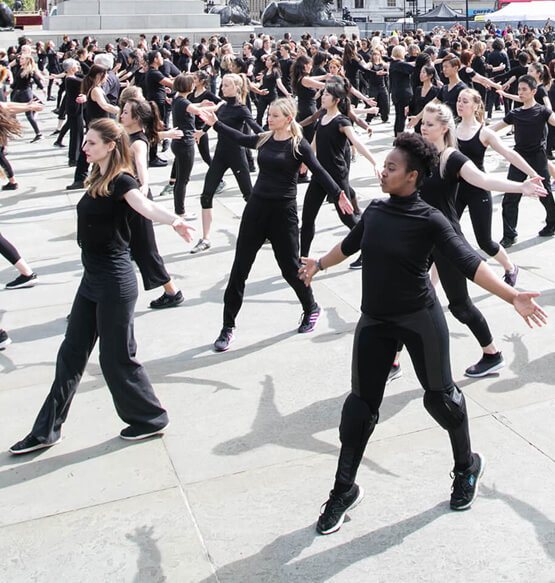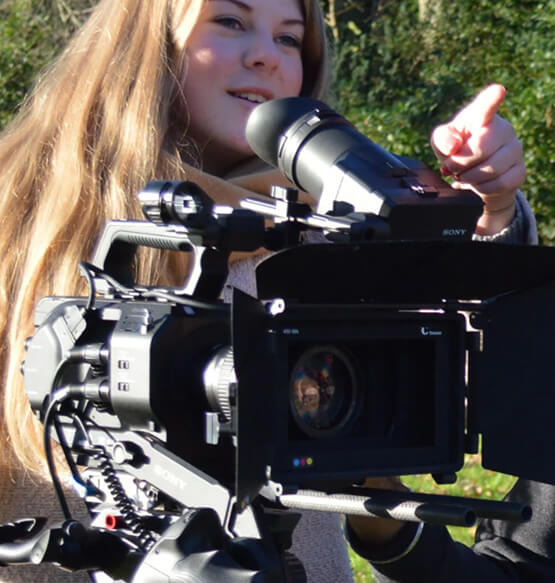You'll need:
112–128 UCAS points (or equivalent)
Foundation Year: 64–80 UCAS points (or equivalent)
International Foundation Pathway:
64 UCAS (or equivalent)
IELTS: 5.5
UCAS codes:
L202
L201 (if choosing Foundation Year)
Start date(s):
September 2026
Explore the forces that shape our world. The BA Politics and International Relations degree gives you the knowledge, confidence, and critical insight to understand how power works - locally, nationally, and globally.
You’ll investigate how governments make decisions, how nations interact, and how social movements transform societies. You’ll also explore the world’s most urgent challenges, from climate injustice to inequality and global conflict, applying political ideas to real-world issues and developing your own policy solutions.
Our aim is to prepare you as a politically informed global citizen and future leader, someone who can analyse, debate, and make a difference in the world.
Top 3 modern university in London
(Complete University Guide 2025)

Ranked in the top 15% in the world
Times Higher Education Young University Rankings 2024

#8 in England for undergraduate student satisfaction
National Student Survey 2024

Modules
Module overview: This module will support you in your transition into Higher Education by providing you with opportunities to adapt to university and university-level study and approaches.
This will include reflecting on our assumptions, critical thinking and ethical writing, considering the place of AI within university study, and exploring ‘social responsibility’.
How you'll learn: You'll gain knowledge through a blended teaching approach that combines mini-taught sessions with interactive, student-led activities. These may include reading and presenting information, participating in group work, solving problems, engaging in discussions or debates, completing quizzes, and taking part in workshops. Alongside learning the core content of the module, you'll also develop transferable skills that enhance your employability. These activities are designed to help you apply what you’ve learned and deepen your understanding of key concepts.
How you'll be assessed: You will be assessed through a report and a poster.
Module overview:
This module is your gateway to understanding the fundamental elements of political studies. We'll explore the structure and functions of the state, the core principles of constitutionalism, and the practical workings of democratic institutions. You'll discover how political attitudes develop through culture and socialisation, and how these influences shape participation and voting behaviour. We'll then analyse the dynamics of power and influence in political life, gaining a critical overview of major political ideologies. We'll also investigate the crucial role of media and social movements in shaping political communication and driving change, concluding with an introduction to public policy formulation and implementation. By the end of this module, you'll have a solid grounding in the key aspects of the political world, helping you make sense of current events and consider your own role in shaping society.
How you'll learn:
You'll learn through lectures, seminars, workshops and team and individual tutorials.
How you'll be assessed:
This module will be assessed using a case study and a presentation.
Module overview:
This module explores how core ideas like power, authority, citizenship, democracy, liberty, and equality have been theorised and debated, examining them through the lens of significant moments in British history. We consider how the meanings behind political concepts have shifted and contested over time.
Module overview:
This module provides the tools to understand the complex forces shaping our world's biggest challenges- from wars and vast economic inequalities to human rights crises. You'll delve into politics using both a historical and theoretical lens, gaining the ability to identify and explain the processes behind global issues. We'll examine how major global challenges have evolved, through alternative theoretical frameworks such as Realism, Liberalism, Marxism, Constructivism, and Feminism. You'll also analyse how various actors – from individuals and governments to international organizations – approach these problems, dissecting their diverse roles on the world stage.
This module establishes the foundational theories and frameworks that will underpin your success in later, more advanced modules in international relations. You'll be introduced to key subfields including international security, political economy, foreign policy, and IR theory. Through engaging case studies, you'll gain practical insight into real-world global challenges like conflict, economic injustice, and migration. You'll learn to identify and describe the factors driving both cooperation and conflict in world politics, appreciating the inherent diversity of international relations and applying powerful theories to comprehend contemporary global issues.
How you'll learn:
You'll learn through weekly lectures and seminar/workshops.The lectures will discuss the topic of the week and will put them in historical and contemporary context, employing case studies, videos and other media where necessary. The seminar and other interactive activities will concentrate on enabling you to express your understanding of the main weekly conceptual themes through applying them to topics of interest to you.
There will be an additional 30 minutes of asynchronous digital support per week. This will consist of walking through assignments, conducting research, identifying sources, and more.
How you'll be assessed:
This module will be assessed using a group podcast and an essay.
These are the current planned modules on this course and may be subject to change.
Module overview:
What should we do about homelessness? Do animals have rights? Should the state prohibit private schooling? Should inheritance tax be scrapped? Is racial profiling unjust? Should the state subsidize equal parental leave for new parents? Should the NHS be privatised? These are just some of the difficult and divisive social and political questions that we’ll explore on this course. The module aims to equip students with the conceptual and theoretical resources needed to understand political debates inside and outside the classroom. In doing so, it introduces students to key thinkers, frameworks, and critical perspectives in political theory, and develops advanced skills in the identification, analysis, and construction of philosophical argumentation. Students will then apply those theoretical tools to public policy recommendations advanced by the government, political parties, think tanks, charities, and various sector practitioners.
How you’ll learn:
You’ll engage with one thinker and one policy issue each week. Sessions are split between exploring political theory and applying it to real-world policy proposals. You’ll take part in short lectures, debates, group work, quizzes, and analysis exercises. You’ll also complete group policy templates, with support for using GenAI tools to develop and evaluate your ideas.
Module overview:
The purpose of this module is to teach you about carrying out social research. It is designed to introduce you to the processes involved in research design and their application to the social sciences, in particular sociology, criminology, and policing. It is a practical module, during which you will conduct empirical research, consider ethical issues, and write a research proposal. We will examine the theoretical, ethical, and practical dimensions of the research process and will look at the range of quantitative and qualitative methodologies for collecting and analysing social scientific data.
By the end of the module, you will be competent in carrying out criminological and/or sociological research. You will also develop a range of transferable skills including quantitative and qualitative data analysis and using software such as SPSS.
How you’ll learn:
You’ll learn through a mix of workshops, group activities, problem-solving tasks, and discussions. You’ll develop research skills by working hands-on with data, exploring ethical issues, and preparing your own proposal. Moodle will guide you through weekly topics and help you build the skills you need for assessments.
Module overview:
This module introduces students to the methodology and practice of comparative politics. It does so by engaging in a systematic examination of some of the main issues, both thematic and methodological, involved in the study of comparative political systems today, and then by applying the insights gained to leading political systems. The module builds on knowledge gained in What is Politics? to further explore the structures of governments, the variations in state organisation, governmental forms and party systems. It will examine the main elements of the modern democratic state in a comparative manner, stressing both the commonalities and differences between systems around the world.
How you’ll learn:
You’ll explore political systems through lectures and seminars that emphasize critical thinking and comparison. In seminars, you’ll analyse case studies, debate key issues, and work both independently and in groups. You’ll apply theory directly to real-world examples and sharpen your skills in comparing political institutions across countries.
Module overview:
This module explores urgent and contemporary issues on violence, conflict, security, and the role of institutions and states. Building on Understanding Global Politics, this module will employ concepts from International Relations to current debates on international cooperation on issues of security, conflict, climate change, sustainable development and more. Students will have the opportunity to explore and critique the role of state and non-state actors, including global institutions like the United Nations, expanding to social movements and humanitarian efforts. This module will also examine how norms are developed, challenged, and changed over time. This module aims to incorporate political, theoretical, and sociological approach towards a comprehensive understanding of global issues and how we address pressing challenges.
How you’ll learn:
Each week, you’ll tackle a major global issue through lectures and group-based seminars. You’ll be expected to complete weekly readings and contribute to discussions, debates, and case study reflections. Sessions encourage you to connect academic theory with contemporary global challenges.
These are the current planned modules on this course and may be subject to change.
This course offers all students the option of a one-year paid work placement, to boost your employability even further. If you choose this route, you will take the placement following year two of your course, and then return to complete your degree.
Why take a placement?
A placement year is the perfect opportunity to gain valuable work experience, to build on the career skills we will teach you on this degree. The connections you make on the placement will improve your career prospects further, and equip you with the skills you need to secure graduate-level employment.
How we support you
The University's Placement and Work Experience Team are experts at helping you to secure a placement. They will work closely with you from the start, helping you research potential employers, discover placement opportunities, create and pitch your CV, and will coach you to perform well in interviews. We aren't able to guarantee a placement, but our sector-leading advisors will give you the best possible chance of securing one.
Find out more about how we'll support you
We understand that your plans might change once you start your programme. If you decide not to do a placement, you will have the option of completing the three year version of your programme.
Whatever your choice, you will have access to many opportunities for work experience through our Placement and Work Experience Team, and access to face-to-face and 24/7 online careers support.
Module overview:
This module enables students to research and produce a project of their own choice. During the module, students write a piece of work based on their own field work and the collection of primary data through quantitative and/or qualitative research methods, or engage in a wholly theoretical, library-based investigation.
How you’ll learn:
You’ll design and carry out your own research, supported by workshops and seminars focused on every stage of the project. You’ll take part in practical exercises and group discussions to build your methodology and writing skills. Moodle will support you throughout your research journey.
Module overview:
This module examines the relationship between democratic principles and the pursuit of justice, asking is democracy a prerequisite for peace. Using empirical evidence, case studies, debates, policy analysis, and more, this module aims to build on Applied Political theory to analyse the relationship between democracy and justice. We will compare liberal democracy and non-democratic regimes to explore the struggles towards justice. Students will discuss the concept of justice and how it relates to the purpose of democracy through the lens of contemporary issues, political controversies and dilemmas.
How you’ll learn:
You’ll learn through lectures, debates, and case studies. You’ll discuss real-world regimes, assess policy documents, and analyse justice in different political contexts. You’ll work both individually and in groups to evaluate evidence and develop strong, well-reasoned arguments.
Module overview:
This module explores the complex relationship between geography, politics, and power. We will consider how power is asserted and contested spatially, examining behaviours of states in the Global North and Global South. The module will examine the key concepts of geopolitics, critical geopolitics, foreign and economic policy from a global and regional perspective. We will study topics including competition and cooperation amongst states, territorial disputes, and emerging powers. Students will learn how to deconstruct geopolitical narratives and develop arguments on what the World Order is and what it should resemble.
How you’ll learn:
You’ll explore geopolitical issues through a mix of lectures, seminars, and structured debates. Weekly readings, videos, and group tasks will help you think critically and analytically about global power dynamics. You’ll be encouraged to lead discussions and challenge dominant narratives.
Module overview:
Human action and inaction are responsible for a great deal of damage to the planet and suffering in our fellow creatures. For instance, in various places across the globe, we are the cause of deforestation, desertification, pollution, climate change, species extinction, and ecosystem collapse. In this module, we explore what we owe to other animals and the environment and think about the kinds of laws and policies that might be introduced to protect the nonhuman world against harmful human activity.
This multidisciplinary module begins by introducing students to key theoretical and analytical tools needed to navigate central debates around our use and treatment of animals and the environment. The subsequent topics will be selected by students from a wide range of options. The course exposes students to cutting-edge work on animal and environmental issues and gives them the opportunity to develop their own positions on some of the most pressing moral and political questions facing us today.
How you’ll learn:
You’ll take part in short lectures, interactive activities, debates, and group discussions. Weekly handouts and digital tools like Padlet and Mentimeter will guide your learning. You’ll also hear from guest speakers and explore your own interests within animal and environmental politics.
These are the current planned modules on this course and may be subject to change.
This course offers a foundation year, which takes place at the beginning of your studies. Studying a foundation year will give you academic and practical experience, and a strong introduction to your subject, ensuring you succeed on your undergraduate degree.
30 credits
You will develop your core academic and integrated English language skills of speaking, listening, reading and writing. You will become familiar with key academic skills and concepts, such as referencing methods and awareness of academic integrity and tone. You will apply these skills and knowledge to both broad topics and also your chosen subject pathway.
Teaching and learning
You will be required to actively engage in on-campus learning for up to 10 hours a week.
You will be taught through a full range of teaching and learning methods, which include lectures, seminars, workshops, discussion groups, group directed tasks and presentations. This will enable you to learn from your peers and tutors in both structured and information settings.
You will be encouraged to think creatively about your approach to learning and discussions with your peers. You will also have access to recordings, resources, links and signposting through Moodle to enrich your learning.
Assessment
You will be assessed through group and individual presentations, comparative and reflective essays, multiple choice exams, coursework and reports, oral exams, portfolios, case studies and blogs.
30 credits
You will develop your core academic and integrated English language skills of speaking, listening, reading and writing. You will become familiar with key academic skills and concepts, such as referencing methods and awareness of academic integrity and tone. You will apply these skills and knowledge to both broad topics and also your chosen subject pathway.
Teaching and Learning
You will be required to actively engage in on-campus learning for up to 10 hours a week.
You will be taught through a full range of teaching and learning methods, which include lectures, seminars, workshops, discussion groups, group directed tasks and presentations. This will enable you to learn from your peers and tutors in both structured and information settings.
You will be encouraged to think creatively about your approach to learning and discussions with your peers. You will also have access to recordings, resources, links and signposting through Moodle to enrich your learning.
Assessment
You will be assessed through group and individual presentations, comparative and reflective essays, multiple choice exams, coursework and reports, oral exams, portfolios, case studies and blogs.
30 credits
You will develop your research, numeracy and information technology skills. You will investigate the difference between primary and secondary research, conduct your own research project and demonstrate your findings through data analysis. You will also develop your awareness of equality, diversion and inclusion in the UK, through a real-world issue; discrimination in the workplace.
Teaching and learning
You will be required to actively engage in on-campus learning for up to 10 hours a week.
You will be taught through a full range of teaching and learning methods, which include lectures, seminars, workshops, discussion groups, group directed tasks and presentations. This will enable you to learn from your peers and tutors in both structured and information settings.
You will be encouraged to think creatively about your approach to learning and discussions with your peers. You will also have access to recordings, resources, links and signposting through Moodle to enrich your learning.
Assessment
You will be assessed through group and individual presentations, comparative and reflective essays, multiple choice exams, coursework and reports, oral exams, portfolios, case studies and blogs.
30 credits
This module supports a broad exploration of crime and law and its integration within society across various sources, which includes diverse cultural, social, and political representations. By analysing a wide range of topics, you are encouraged to critically engage with how disability, gender and race are represented and viewed in relation to crime and law.
This course integrates sustainability by looking at the sustainability of social interactions and your results and consequences in relation to crime and law. Social responsibility, legal injustice across the globe and inequality are all featured. Social Responsibility is embedded through topics such as social identity, prejudice and exclusion. Social Cognitive Theory and Rational Choice Theory helps you understand challenges and question accountability for individuals and communities.
This course fosters global engagement by examining the inequalities experienced in other cultures, particularly in relation to race, gender and exclusion. Global challenges are addressed at every step equipping you with the skills to navigate a globalised world in a variety of ways. By analysing data and text concerning diverse cultures and contexts, you will develop an understanding of how individuals and cultures operate amongst injustices in a globalised world, preparing you to engage thoughtfully with diverse audiences.
Teaching and learning
Through lectures, workshops, group work, and structured academic writing, you will have the opportunity to practice the core academic skills needed for your future studies. Critical thinking will be developed through tasks such as text analysis, group discussions, and the ability to create well-structured academic assignments, including essays and presentations.
The teaching delivery for each module consists of one, one-three-hour lecture and one, two-hour workshop per week. You will get a diverse learning experience through case studies and active learning workshops and microteaches.
You will also have an additional 30 minutes of online support each week, consisting of activities to develop your presentation skills and to provide you with opportunities to explore wider policy implementation in diverse/comparative transnational examples.
Assessment
This module will be assessed using a video presentation and summative essay.
30% - video presentation, working in groups, you will produce a video on a topic taught on the curriculum and explain its impact on UK society, using a real-world example.
70% - summative essay, you will identify an issue, either historical or contemporary, that has had an impact on UK society and connect it to at least one of the key topics covered in the course.
30 credits
This module supports a broad exploration of social understanding across various sources, which includes diverse cultural, social, and political representations. By analysing a wide range of topics, you are encouraged to critically engage with how disability, gender and race are represented and viewed. This ensures that your projects and research can reflect a variation of perspectives, fostering a more inclusive and holistic learning environment.
This course integrates sustainability by looking at the sustainability of social interactions and your results and consequences. Social responsibility, globalisation and inequality are all featured. Social Responsibility is embedded through topics such as social identity, prejudice and exclusion. Social Cognitive Theory and Rational Choice Theory help you understand challenges and question accountability for individuals and communities.
This course fosters global engagement by examining the inequalities experienced in other cultures, particularly in relation to race, gender and class. Global challenges are addressed at every step, equipping you to navigate a globalised world in a variety of ways. By analysing data and text concerning diverse cultures and contexts, you develop an understanding of how individuals and cultures operate in a globalised world, preparing you to engage thoughtfully with diverse audiences.
Teaching and learning
The teaching delivery for each module consists of one, one-three-hour lecture and one, two-hour seminar per week. Lecturers will cover core indicative content, while seminars will consist of research workshops, as well as forming small groups and learning on relevant case studies.
You will also have an additional 30 minutes of online support each week, consisting of activities to develop your presentation skills and to provide you with opportunities to explore wider policy implementation in diverse/comparative transnational examples.
Assessment
This module will be assessed using an academic poster and a summative essay.
40% - academic poster, you will design a poster that provides key information and sociological analysis of your selected story or issue chosen from key weekly topics.
60% - summative essay, you will conduct a sociological analysis of a story or issue you have encountered in the media.
These are the current planned modules on this course and may be subject to change.
Why study Politics and International Relations at Roehampton?
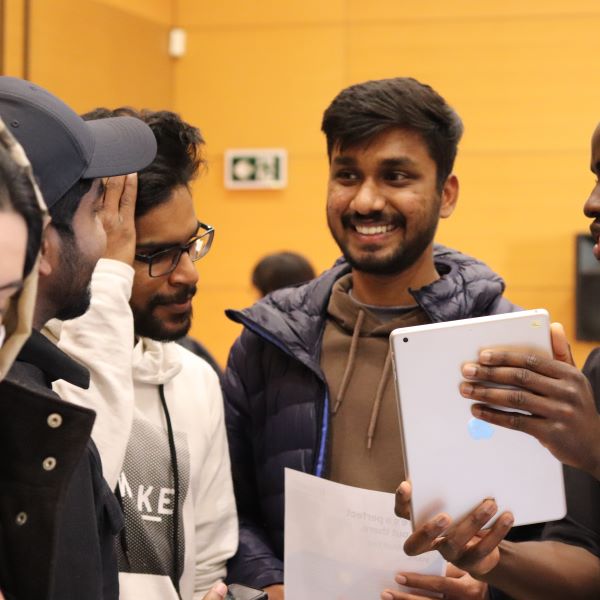
Learn from passionate experts:
Your lecturers are active researchers and practitioners with expertise in global governance, human rights, sustainability, and social justice.
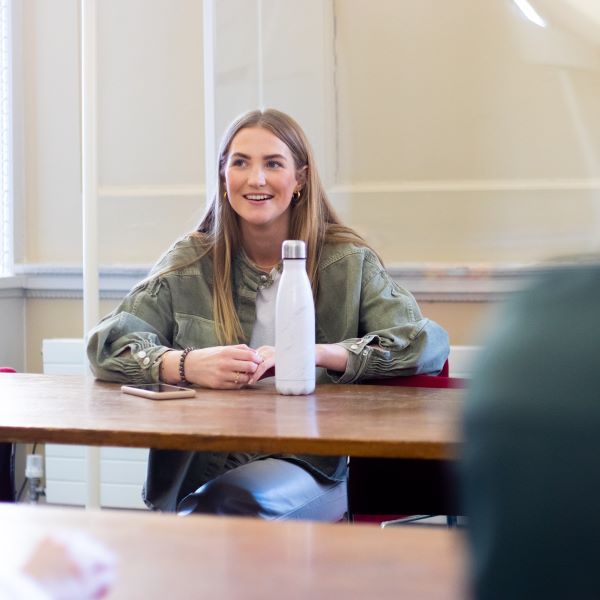
Develop cutting-edge digital skills:
From creating campaign websites and producing podcasts to learning how to use AI ethically and effectively, you’ll build the digital confidence needed to succeed in today’s data-driven world.

Inclusive, supportive learning community:
You’ll study in small, engaging classes and receive one-to-one guidance from your Academic Guidance Tutor. Our school fosters belonging, inclusion, and confidence, ensuring every student thrives.
Career
With your Politics and International Relations degree, you’ll graduate ready to shape policy, influence change, and lead conversations that matter.
You’ll develop highly transferable skills in:
- Research, analysis, and data interpretation
- Public speaking and persuasive communication
- Policy writing and problem-solving
- Critical thinking and ethical decision-making
- Digital literacy and AI awareness
- Your future career could include roles such as:
- Civil Service or Government Policy Officer
- Political Researcher or Analyst
- Diplomat or International NGO Worker
- Campaign or Advocacy Officer
- Journalist or Media Correspondent
- Charity, Development or Human Rights Worker
- Social or Market Researcher
- Political Consultant
You’ll also be well prepared for postgraduate study in politics, international relations, journalism, law or teaching.
The Student Futures team is here to support you throughout your time at Roehampton and beyond.
They offer services tailored to your needs, helping you take confident steps towards your future.
You’ll have access to a wide range of career workshops and events, where you can engage with employers and develop the skills you need to succeed in the workplace.
These opportunities will help you build your CV, prepare for interviews, and connect with successful Roehampton graduates who are thriving in their careers. You’ll also be able to engage with our partners across London and beyond.
Wherever you want to go in the future, you'll be preparing for the world of work from your very first day.
Learning and assessment
You'll graduate ready to shape policy, influence change, and lead conversations that matter.
How you'll learn
- Interactive workshops and seminars: Engage in debates, simulations, and collaborative projects.
- Applied learning: Work on real-world problems, create podcasts, write policy briefs, and design campaign websites.
- Research and inquiry: Develop advanced research and analytical skills through hands-on projects in modules like Adventures in Research Methods.
- Guest speakers and field opportunities: Learn directly from practitioners, policymakers, and community leaders.
- Individual support: Regular meetings with your Academic Guidance Tutor and access to academic, wellbeing, and career services.
How you'll be assessed
- Essays, policy papers, and reflective journals
- Group podcasts and campaign websites
- Presentations, debates, and assessed conversations
- Independent research projects in your final year
Assessments are designed to reflect professional practice, helping you build confidence in public speaking, digital communication, and policy design.
Graduate outcomes
Graduates of BA Politics and International Relations leave Roehampton equipped to analyse, engage, and lead in diverse professional contexts.
You’ll be:
- Career-ready: Equipped with the communication, research, and digital skills sought by employers in government, NGOs, and global organisations.
- Ethically and globally aware: Able to engage with complex global issues with empathy and critical insight.
- Confident and adaptable: Skilled at working collaboratively, managing projects, and navigating digital tools responsibly.
- Socially engaged: Ready to contribute to positive change in your community and beyond.
Our inclusive and interdisciplinary approach ensures you graduate not only with academic knowledge, but with the skills and self-belief to turn that knowledge into meaningful action.
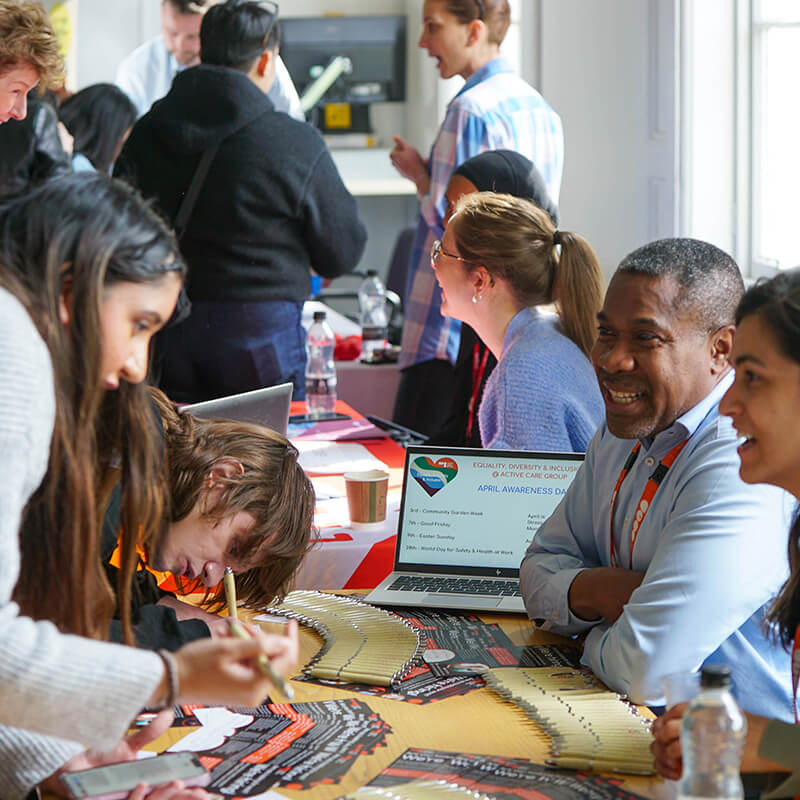
Open days
Get a real taste of our campus, community and what it’s like to study at Roehampton
Applying
Full-time UK undergraduate students apply through UCAS.
Entry tariff
112–128 UCAS points (or equivalent)
Foundation Year: 64–80 UCAS points (or equivalent)
Looking to work out your UCAS points or find out about our entry requirements? Find out more.
When we consider applications to study with us, we form a complete view of your achievements to date, and future potential, and can offer flexibility in entry requirements. Find out more about our Contextual Offer scheme.
We welcome applicants with a wide range of qualifications, including BTECs, A-levels and T Levels.
General entry requirements
International undergraduate students apply through our direct application system.
Entry tariff
112–128 UCAS points (or equivalent)
International Foundation Pathway:
64 UCAS (or equivalent)
IELTS: 5.5
Looking to work out your UCAS points or find out about our entry requirements? Find out more.
When we consider applications to study with us, we form a complete view of your achievements to date, and future potential, and can offer flexibility in entry requirements. Find out more about our Contextual Offer scheme.
General entry requirements
Fees and funding
UK students
Tuition fees
| Entry date | Undergraduate Year 1 | Undergraduate Foundation Year |
|---|---|---|
| September 2026 | £9,790 | £5,914 |
Prices shown are for the first year of your degree.
Funding your studies
We also provide other ways to support the cost of living, including on-campus car parking, hardship support and some of the most affordable student accommodation and catering in London.
International students
Tuition fees
| Entry date | Undergraduate Year 1 | Undergraduate Foundation Year | International Foundation Pathway |
|---|---|---|---|
| September 2026 | £17,628 | £17,628 | £17,628 |
| January 2027 | – | – | £17,628 |
Prices shown are for the first year of your degree.
Funding your studies
We also provide other ways to support the cost of living, including on-campus car parking, hardship support and some of the most affordable student accommodation and catering in London.


